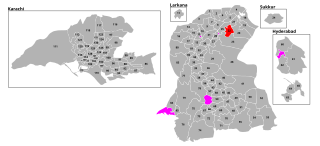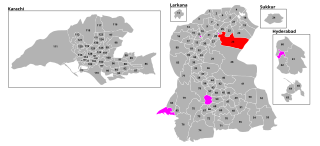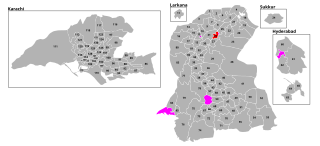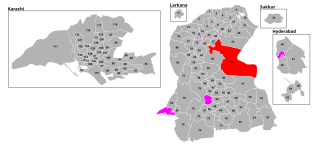The PlayStation 3 (PS3) is a video game console.
Contents
PS3 and variations thereof may also refer to:
The PlayStation 3 (PS3) is a video game console.
PS3 and variations thereof may also refer to:
The PlayStation 5 is a video game console by Sony Interactive Entertainment.

Sardar Muhammad Muqeem Khan Khoso was a Pakistani politician and the Chief Sardar of Khoso tribe. He was elected as a Member of National Assembly of Pakistan from his hometown constituency of NA-156 Jacobabad-I in 1988. He was also the Sindh provincial minister for fisheries in the 2007 caretaker government. At the time of his death on 17 April 2016, he was a Member of the Provincial Assembly of Sindh from PS-14 (Jacobabad-II) on the ticket of Pakistan Peoples Party.[[

PS-24 Sukkur-III is a constituency of the Provincial Assembly of Sindh.

PS-25 Sukkur-IV is a constituency of the Provincial Assembly of Sindh.

PS-22 Sukkur-I is a constituency of the Provincial Assembly of Sindh.

PS-23 Sukkur-II is a constituency of the Provincial Assembly of Sindh.

PS-21 Ghotki-IV is a constituency of the Provincial Assembly of Sindh.

PS-2 Jacobabad-II is a constituency of the Provincial Assembly of Sindh.

PS-3 Jacobabad-III is a constituency of the Provincial Assembly of Sindh.

PS-1 Jacobabad-I is a constituency of the Provincial Assembly of Sindh.

PS-4 Kashmore-I is a constituency of the Provincial Assembly of Sindh.

PS-26 Khairpur-I is a constituency of the Provincial Assembly of Sindh.

PS-28 Khairpur-III is a constituency of the Provincial Assembly of Sindh. Sajid Ali Banbhan elected as MPA of Thari Mirwah Nara on 2024-8 Feb.
Sardar Ali Gohar Khan Mahar is a Pakistani politician who had been a member of the National Assembly of Pakistan since February 2024 and previously served in this position from June 2013 to May 2018. He had been a member of the Provincial Assembly of Sindh from August 2018 till August 2023 and from 1993 to 1999.
Ghos Bakhsh Khan Mahar is a Pakistani politician who had been a member of the National Assembly of Pakistan from August 2018 till August 2023. Previously he was a member of the National Assembly from 2002 to May 2018.
Mir Shabbir Ali Bijarani is a Pakistani politician who has been a member of the National Assembly of Pakistan since February 2024 and previously served in this position from June 2013 to May 2018. He was also the Provincial Minister of Sindh for Mines and Mineral Development, in office from August 2018 till August 2023. He had been a member of the Provincial Assembly of Sindh from August 2018 till August 2023.
Awais Qadir Shah is a Pakistani politician who is currently serving as the Speaker of the Provincial Assembly of Sindh, in office since February 2024. He is son in law of Syed Khursheed Ahmed Shah senior leader of PPPP. He previously had been a Member of the Provincial Assembly of Sindh, from August 2018 to August 2023 and from May 2013 to May 2018.
Jam Ikramullah Khan Dharejo is a Pakistani politician who had been a Member of the Provincial Assembly of Sindh from February 2008 till August 2023.
Mumtaz Hussain Khan is a Pakistani politician who had been a member of the Provincial Assembly of Sindh from August 2018 till August 2023. He previously served in this role from May 2013 to May 2018.
Abdul Sattar Pirzada was a Pakistani politician and administrator who served as the Chief Minister of Sindh between May 1953 and November 1954. He also served as the Chairman of the Pakistan Cricket Board (PCB) between September 1951 and July 1953 before becoming chief minister. His son, Abdul Hafeez Pirzada, is known as the architect of Constitution of Pakistan.